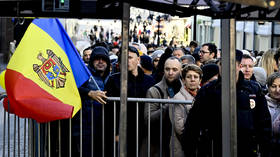Pro-EU president wins second term in ex-Soviet state – Election Committee
Moldova’s Maia Sandu attracted over 55% of the votes in Sunday’s runoff, official numbers show
Moldova’s incumbent pro-EU president Maia Sandu has won a second term in office in Sunday’s runoff, the nation’s Central Election Committee announced on Monday. With 100% of the ballots counted, Sandu has secured 55.33% of the votes, while her competitor, former prosecutor general Aleksandr Stoianoglo got 44.67%, official data shows.
The turnout in the runoff ballot was 54.31% of all registered voters, the committee said in a press release, adding that the results are considered valid if more than 20% of eligible voters take part in the elections.
The police said that a total of 225 violations were reported during the voting, ranging from ballot damage to illegal political agitation and voter bribing.
Under Moldovan law, the Central Election Committee is to submit its final report on the voting results to the nation’s constitutional court in five days.
Sandu declared her victory on Monday, when over 98% of the ballots were counted. At that time, the results were already showing that she enjoyed a ten-point lead over her rival. Early results suggested Stoianoglo was leading by a slim margin but the incumbent overtook him by midnight and the gap between the two kept growing.
European Commission President Ursula von der Leyen immediately congratulated Sandu on her victory, vowing to work together with her “towards a European future for Moldova and its people.” Sandu herself promised to be “a president for everyone” in her victory speech.
Last month, the former Soviet republic held a referendum on whether its EU aspirations should be enshrined in its constitution. The pro-EU camp won by a slim margin of 50.35% for the amendment and 49.65% against it.
Sandu attracted 42% of the votes in the first round of elections last month. Moldovans living in Western Europe were instrumental in her win over Stoianoglo, who took 26% of the votes. A runoff was then forced, however, as she’d failed to get the support of a simple majority of voters.
After the first round, Sandu claimed that there was “clear evidence” of criminal groups supposedly colluding with “foreign forces hostile to our national interests” to interfere with the voting. The claim prompted Moscow to demand she provide evidence to substantiate her statements.
Prior to the vote, Moldovan authorities claimed they’d found evidence of Russian attempts at such meddling. The Kremlin strongly rejected these accusations.
The opposition Socialist Party that backed Stoianoglo has refused to recognize Sandu’s victory. In a statement, the party branded her an “illegitimate” president who was only “recognized by her sponsors and supporters abroad.”
You can share this story on social media:









Comments are closed.